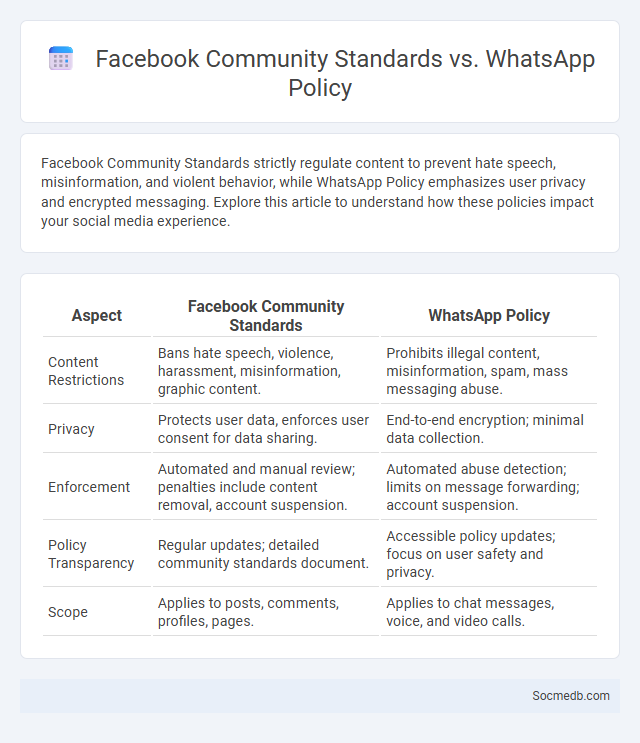
Photo illustration: Facebook Community Standards vs WhatsApp Policy
Facebook Community Standards strictly regulate content to prevent hate speech, misinformation, and violent behavior, while WhatsApp Policy emphasizes user privacy and encrypted messaging. Explore this article to understand how these policies impact your social media experience.
Table of Comparison
| Aspect | Facebook Community Standards | WhatsApp Policy |
|---|---|---|
| Content Restrictions | Bans hate speech, violence, harassment, misinformation, graphic content. | Prohibits illegal content, misinformation, spam, mass messaging abuse. |
| Privacy | Protects user data, enforces user consent for data sharing. | End-to-end encryption; minimal data collection. |
| Enforcement | Automated and manual review; penalties include content removal, account suspension. | Automated abuse detection; limits on message forwarding; account suspension. |
| Policy Transparency | Regular updates; detailed community standards document. | Accessible policy updates; focus on user safety and privacy. |
| Scope | Applies to posts, comments, profiles, pages. | Applies to chat messages, voice, and video calls. |
Introduction: Overview of Facebook and WhatsApp Guidelines
Facebook and WhatsApp enforce comprehensive community guidelines designed to ensure user safety and promote authentic interactions across both platforms. These guidelines restrict harmful content, misinformation, and harassment while encouraging respectful communication and privacy protection. Your adherence to these standards helps maintain a positive environment for billions of users globally.
What Are Facebook Community Standards?
Facebook Community Standards establish the guidelines for acceptable content and behavior on the platform, designed to maintain a safe and respectful environment for over 2.9 billion users. These standards prohibit hate speech, harassment, misinformation, and violent content, while promoting authenticity and content integrity. Enforcement involves a combination of artificial intelligence and human reviewers to detect and remove violations promptly.
Key Features of WhatsApp's Policy
WhatsApp's policy prioritizes end-to-end encryption to ensure user privacy and secure messaging across all platforms. It enforces strict data handling practices, limiting information sharing with Facebook and third-party services to protect user data. The policy also includes transparency in user consent for data processing, offering options for controlling privacy settings and data sharing preferences.
Comparing Facebook and WhatsApp Safety Requirements
Facebook and WhatsApp implement distinct safety requirements tailored to their platforms, with Facebook emphasizing content moderation and user reporting tools to combat misinformation and harassment. WhatsApp prioritizes end-to-end encryption for message privacy, ensuring that only you and the recipient can read the messages sent. Understanding these differences helps You make informed decisions about privacy and security on each platform.
Content Moderation: Facebook vs WhatsApp
Content moderation on Facebook relies heavily on advanced AI algorithms combined with human reviewers to detect and remove harmful content such as hate speech, misinformation, and explicit material across its vast platform. WhatsApp employs end-to-end encryption, limiting its ability to scan messages directly; instead, it focuses on user reporting and metadata analysis to combat spam and abuse while maintaining privacy. Facebook's broader ecosystem facilitates proactive content policing, whereas WhatsApp emphasizes privacy-preserving moderation techniques due to its encrypted messaging framework.
Privacy Controls: WhatsApp Policy vs Facebook Standards
Your privacy on social media is shaped by distinct frameworks, with WhatsApp enforcing end-to-end encryption to safeguard message content, while Facebook applies broader data collection aimed at personalized advertising and social interaction analytics. WhatsApp's policy limits data sharing outside of message metadata, ensuring conversations remain private, whereas Facebook's standards permit extensive user data tracking across multiple platforms for targeted marketing purposes. Understanding these differences empowers you to make informed decisions about platform usage and manage privacy settings effectively.
Enforcement Mechanisms: How Violations Are Addressed
Social media platforms implement enforcement mechanisms such as content moderation, automated flagging systems, and user reporting tools to address violations of community guidelines and policies. These mechanisms involve a combination of artificial intelligence algorithms and human reviewers who assess reported content for hate speech, misinformation, harassment, or other prohibited behavior. Your interactions with these platforms are monitored to ensure compliance, with consequences ranging from content removal and account suspension to permanent bans for severe or repeated offenses.
User Experience: Reporting and Appeals
Social media platforms prioritize user experience by offering streamlined reporting tools to address harmful or inappropriate content quickly and effectively. Your ability to appeal decisions ensures transparency and fosters trust in the moderation process. Efficient reporting and appeal systems contribute to a safer, more engaging online community tailored to your needs.
Impact on Free Expression and User Safety
Social media platforms play a crucial role in shaping free expression by providing individuals with unprecedented opportunities to voice opinions and engage in public discourse globally. However, balancing this freedom with user safety remains challenging, as harmful content, harassment, and misinformation can compromise online environments. Advanced content moderation technologies and clear community guidelines are essential to safeguarding users while preserving open dialogue on these digital platforms.
Conclusion: Choosing the Best Standards for Online Communities
Selecting the best standards for online communities ensures a safer and more engaging social media experience. Prioritizing clear guidelines on user behavior and content moderation protects your digital space from abuse and misinformation. Effective standards foster trust, encourage positive interactions, and support sustainable growth across platforms.
 socmedb.com
socmedb.com